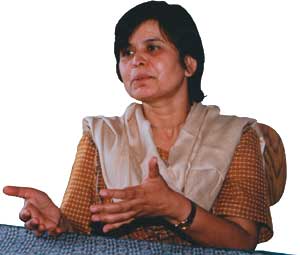 Renu Rajbhandari was a medical officer at Teku Hospital ten years ago. AIDS was just beginning to show itself in Nepal, and health professionals employed at the central health laboratory would get excited whenever they came across a new case. "At that time we were just interested in numbers," Renu recalls.
Renu Rajbhandari was a medical officer at Teku Hospital ten years ago. AIDS was just beginning to show itself in Nepal, and health professionals employed at the central health laboratory would get excited whenever they came across a new case. "At that time we were just interested in numbers," Renu recalls. All that was soon to change. HIV spread dramatically, and is now poised to become the biggest killer of young Nepalis. And for Renu, there was the shocking realisation that behind the statistics were searing personal tragedies. Ten years ago, the young doctor went on a field visit to Nuwakot and came face-to-face with the disease. "She was a 19-year-old dalit girl who had been sold by her uncle to a Bombay brothel when she was 12. She managed to escape after six years, but not after being infected."
The visit jolted Rajbhandari out of her comfortable existence because the girl accused her of selling their blood. Renu remembers thinking: "Here I am an educated doctor, society had invested in me. But I felt useless. I am giving nothing back to society." Renu was haunted by the torture, mental and physical suffering the girl in Nagarkot had been through in her young life.
Two months passed in a fit of depression and introspection, when Renu's husband encouraged her to do something about the problem. She was determined to change the focus of her work. She took off to Nuwakot, where she spent two months visiting the village of Ghyangphedi collecting as much information as she could about trafficking. "I had no idea about the issue, I had no organisation, no funding, I was just driven by emotion."
Today, the Women's Rehabilitation Centre (WOREC) which Renu set up in 1991 is among many groups in Nepal addressing women's health as a human right. Gender discrimination in Nepali society is taking its toll on women's health, and is at the root of evils like trafficking.
Asked about the recently passed Women's Bill, Renu feels it is still going for welfare, whereas Nepali women need their basic human rights ensured and laws implemented properly. "The patriarchal notion of the state is strongly evident in the bill, and also in the domestic violence bill presently being discussed," she says, and is doubtful they will change the status of Nepali women. Renu thinks the newly-formed Women's Commission is a positive step, but is overtly politicised and doesn't have teeth.
But Renu has managed to sink her own teeth into the problem with WOREC's work in 11 districts around the country. Some 200,000 women in Udaypur, Siraha, Morang, Sindhupalchok, Mustang benefit from the organisation's work. The Maoist insurgency has affected activities in some districts, but WOREC's women-centred health programmes continue in others. Barefoot gynaecologists teach women about their bodies, how to take care of themselves, about nutrition.
The group runs community mediation centres where trained paralegals look into cases ignored by the police as well as shelters for trafficked women in the border town of Janakpur. Renu practices what she preaches: she is avoiding the welfare approach, trying to get cooperatives of women to do things themselves.


